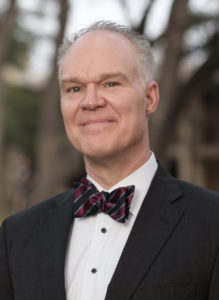Professor Reuben McDaniel (1936-2016) was an accomplished scholar, a model teacher and a commanding presence in business school at The University of Texas for more than three decades. He was also (in partnership with his wife Myra) a leader at St. James’ Episcopal Church, where my spiritual director (who had recently served as interim rector) sent me in 1991 saying, “This will be your church now.”
My spiritual director didn’t tell me that St. James’ had been founded in 1941 by African-Americans who had been turned away from Austin’s White Episcopal congregations. He didn’t tell me that I’d be one of the few pale faces in the room or that I might feel at a loss to find an easy way to fit in to this particular incarnation of the Body of Christ. That was to him, apparently, beside the point.
A few years after I joined St. James’ and began teaching at the business school, a law professor wrote an op-ed in The Daily Texan making the racist claim that “minority students” performed poorly in college because “their cultures didn’t sufficiently shame” those who failed. The next day I got a call from Reuben McDaniel. “You need to write a rebuttal,” he said.
Mind you, before then I had never had an actual conversation with Reuben McDaniel —whom I idolized and feared — and couldn’t figure out why he was calling me. I wasn’t political and, as one of the younger members of the business school faculty (and the only openly gay one), wasn’t inclined to draw attention to myself.
“I appreciate your confidence, Reuben, but no one’s going to listen to me. You’re a powerful person and a better writer. People would rather hear from you.”
“That’s true,” McDaniel said, “but we need a response from someone who looks like you.”
I didn’t know how I’d find time or what I might say or what trouble I might get into, but I knew then that I would write the piece because McDaniel was giving me a chance to join him on the court. He was taller and stronger and faster, but I was (at the moment) in the right position to take a shot, and he was setting me up.
Unjust systems divide people and hold onto power by doling out privileges that we are afraid of losing – and, since it’s morally inconvenient to acknowledge our unfair advantages, when our privileges are called out, we typically deny their unfairness or their spiritual costs (which is blind) or to try to disown them (which is irresponsible). But McDaniel’s move offers another option: stewardship.
What if unjust privilege actually has one just use: to subvert the system that creates it?
Perhaps this is the lesson of that most perplexing of Jesus’ parables, the story of the “unrighteous steward” in Luke 16. The steward’s boss (an exploitive moneylender, perhaps) is about to fire him for mismanagement, and the steward calls in the boss’s debtors and shows them how to mark down their debts. His liberating transgression earns him gratitude that will come in handy when he’s turfed out of his job. After praising the steward’s shrewdness, Jesus commands us all: “Make friends for yourself by means of unrighteous wealth.”
I can imagine him saying: “Invest your unjust privileges in the business of liberation.”
Over and over Luke’s Jesus admonishes us not to hoard privilege but to forgive debts, to opt out of exploitation by saying yes to costly compassion — for these practices displace the fear and greed that fund injustice. In these practices we meet outside the confines of oppressive systems and join the Love that brings them down.
It becomes more bearable, exciting even, to face privileges I’ve unjustly inherited when I see them as tools with which to strike against injustice and can aspire to learn their right use from those who have a different perspective in the battle. As a friend from St. James’ told me: “Yeah, this is your work to do, but I don’t trust you to do it by yourself.”
I was able to hear McDaniel’s challenge because it came as a gift, an invitation to play, an opportunity to be with him on a mission that matters. He mercifully pointed out what I wasn’t conscious enough to see and affirmed the good I wasn’t yet bold enough to dare. He made the work I had to do an occasion for friendship.
Who is inviting you to invest your privilege in the work of justice?
Whom could you help invest their privilege in the work of justice?
This spring, the Sowing Holy Questions blog will focus on issues of racial healing. Writers will reflect on what has been done, what change ought to happen, and offer visions for healing in our communities.


